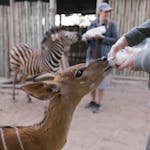Make it yours
Every experience is customised to be just right for you.
WILDLIFE VOLUNTEERING: THE RED FLAGS MOST PEOPLE MISS
Learn more
Enter the gripping world of wildlife conservation in one of Africa’s most important protected ecosystems: the iconic Greater Kruger National Park.
Your experience starts at Moholoholo - the largest wildlife rehabilitation centre in the Kruger - where you’ll help care for animals that have been injured, orphaned and rescued in the national park. You’ll then venture out into the bush at Vikela, where you’ll track and monitor wild animals on foot, learn to read the land like a local, and pass on information to the rhino anti-poaching team in the Greater Kruger region.
If you’ve dreamed of seeing Africa’s legendary species in one of the continent’s most biodiverse regions and making a real difference to their future, this is your chance. No crowded tours. No unethical encounters. Just real on-the-ground conservation and some of the world’s most extraordinary wildlife.



Provide daily care and enrichment to injured animals, learn to track wildlife on foot, and experience the richness of the Greater Kruger’s biodiversity. This combination gives you the chance to roll up your sleeves and play a vital role in multiple areas of conservation.
Based near many important wildlife reserves, including the largest and world-famous Kruger National Park, Moholoholo treats high numbers of injured, hurt and orphaned animals every year, who only survive because of the project’s work and support from volunteers.
You’ll help preserve one of the few intact ecosystems large enough to support self-sustaining populations of threatened species like elephants, lions and wild dogs. During guided game drives through the Kruger you’ll see species in the wild and learn anti-poaching techniques, animal tracking skills and bushcraft. All in a spectacular natural environment.
The Kruger is home to the largest wild rhino population in Africa – and plays a vital role in the future of the species. You will actively help protect these giants from poachers by monitoring rhinos and passing on information to the anti-poaching team in the Greater Kruger.
Walking through the African bush, exploring remote areas that can’t be accessed by vehicles and immersing yourself in the smells and sounds of nature is a life-changing experience. In a time of declining wildlife populations, you’ll be one of the lucky few who can say "I did that".
Moholoholo works in partnership with the EWT, a world-leading authority in wildlife conservation, and is their preferred poisoned vulture recovery and rehabilitation specialist. By joining the project, you’ll learn about their critically important work and the vital role vultures play in creating a healthy ecosystem.
Work alongside highly qualified wildlife professionals, from animal care specialists to field ecologists, who bring the bush environment to life, explaining the art and science of conservation during bushwalks, tracking and game drives.
Whether you’re sitting around the campfire, enjoying a boat trip excursion, or exploring the surrounding area with the team, these two projects are great places to meet like-minded people from around the world.
You can book this experience as it is. Or, you can customise it to be just right for you.

Volunteer at one of the biggest wildlife sanctuaries in South Africa - home to lions, leopards, cheetahs, wild dogs, hyenas, vultures, and many other threatened animals. From preparing enrichment activities to helping maintain enclosures, you’ll get involved with every aspect of animal care and rehabilitation. If you’re lucky, you may even get to experience the moment an animal is safely returned to the wild.

Explore the Greater Kruger Park in a way few others ever do… on foot. Alongside an expert guide, you’ll step into one of the few remaining ecosystems large enough to host a mega population of lions, growing numbers of elephants, plus wild dogs, black and white rhino and other threatened species. Together, you’ll carry out vital practical conservation, monitor iconic species and immerse yourself in the untamed beauty of this UNESCO Biosphere Reserve.
You’ll support the project teams in real hands-on wildlife care and monitoring. Depending on the conservation priorities at the time, this will include a range of the following activities.
You’ll work with a variety of animals, some who can be rehabilitated and released back into the wild and others who require life-long care in a sanctuary.
You will get to observe or assist:
You could also observe or assist:
Most animals arrive at centres with injury or trauma. Depending on your skills and the needs of the project, you could support a professional vet or veterinary nurse in treating these new arrivals.
You could observe or assist:
Looking after young animals is one of the most rewarding experiences. These animals require intensive attention, much like human infants.
You could observe or assist:
Ongoing monitoring of wildlife in the Greater Kruger is essential to understanding and protecting iconic African species. Depending on the work taking place at the time, this will include a range of the following activities.
You will get to observe and assist:
You could also observe or assist:
In addition to rehabilitation and monitoring work, you may also take part in wider conservation initiatives.
You will get to observe or assist with:
This experience also includes a variety of additional activities. You will get to:
You’ll learn about wildlife behaviour, biology, ecology, and conservation issues. Depending on the projects’ work at the time, this will include a range of the following topics.
Related experiences
Explore programs similar to this one.
Step off the tourist trail and connect with highly qualified wildlife researchers, field ecologists and rhino specialists
View details for Masters Of The Wild ExperienceGo behind the scenes of two successful wildlife research projects and one of the biggest animal sanctuaries in South Africa
View details for The Three Frontiers Wildlife Experience